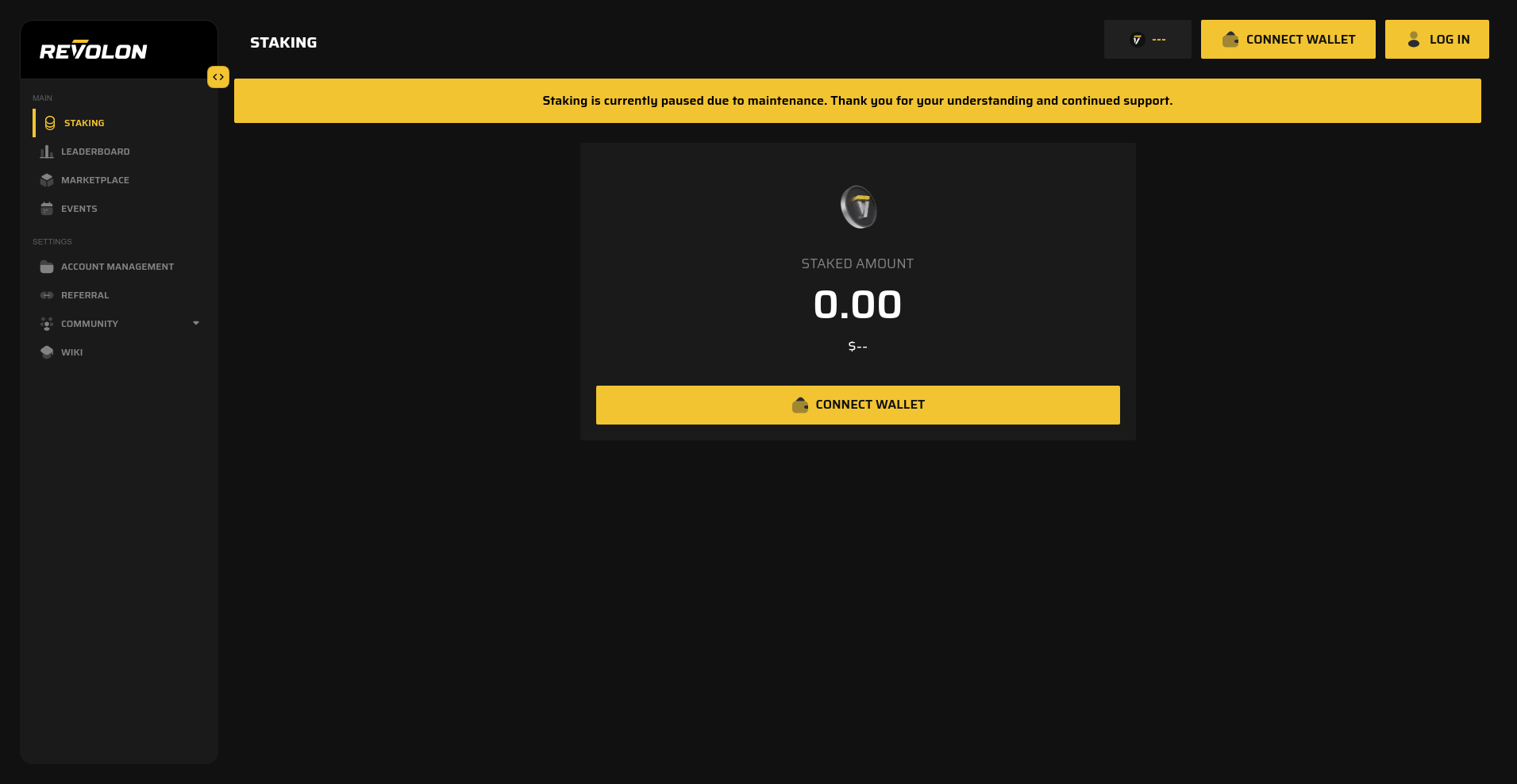Revolon ($RPM) Review: A Data-Driven Analysis of Its Legitimacy, Technology, and Risks

What Is Revolon: An Introduction
Revolon emerges as a Web3 racing game built on Unreal Engine 5, melding traditional gaming aesthetics with blockchain-enabled economies. The project aims to offer players a play-to-earn (P2E) experience through competitive challenges, leaderboard rankings, vehicle customization, and in-game asset trading. The game is positioned as a PC-based multiplayer racing title, emphasizing its entry into the expanding Web3 gaming sector.
This review offers an impartial analysis, synthesizing available data—including audit results, tokenomics, security assessments, and community engagement—to evaluate Revolon’s legitimacy and potential risks. While the project showcases promising features, several critical details require further exploration to establish its long-term viability.
The Team and Vision Behind Revolon
Based on the provided data, Revolon’s team comprises members such as Co-Founder/CEO, Game Director, Growth Lead, and various specialists in game design, development, and branding. However, no publicly available bios or prior experience details are specified, making it difficult to fully assess their credibility or relevance in blockchain and gaming sectors.
Evaluating their roadmap adherence, the project indicates milestones like launching the demo version, securing launchpad partnerships with platforms like Poolz, Kommunitas, and Spores Network, and planning for exchange listings. Despite these milestones, absence of explicit dates and detailed deliverables makes it challenging to gauge their execution capacity.
In summary, while the team demonstrates organizational structure and strategic partnerships, the lack of detailed background information warrants caution. Their ability to fulfill promises depends heavily on future transparency and project momentum.
Revolon Security Audit Results
According to the Cyberscope audit report, Revolon’s smart contract code for its RPM token underwent an assessment that identified one major vulnerability classified as high criticality. The overall community score stands at 59, with decentralization metrics around 61, indicating moderate decentralization and community engagement.
- Audit Overview: A single audit iteration was completed in July 2024, focusing on token security.
- Major Findings: One high-criticality vulnerability was flagged, raising concerns about potential exploits if not promptly addressed by developers.
- Community and Decentralization: Scores suggest a somewhat centralized control structure, which may influence governance and security resilience.
While the security score of approximately 95 out of 100% is high, the presence of a critical vulnerability underscores the importance of further audits and ongoing security assessments before significant investment or integration. The project’s reliance on a limited audit source means that its security posture isn’t fully validated yet, necessitating close monitoring.
A Breakdown of Revolon Tokenomics
The RPM token is the core utility asset for Revolon, facilitating in-game activities such as staking, trading, and tournament participation. The token operates on the Arbitrum blockchain, with an initial total supply of 100 million RPM tokens. Its initial market cap is reported at approximately $520,000, with an upcoming public sale at $0.10 per token, and a maximum FDV of around $15 million.
- Total Supply: 100 million RPM, with unspecified circulating supply.
- Utility: In-game currency, staking, tournaments, asset trading, and season passes.
- Distribution: The public sale plans to allocate $500,000 with a 20% Token Generation Event (TGE) release, followed by a 12-month linear vesting period.
- Incentive Mechanics: Staking is a key feature, though current interface indicates staking is temporarily paused for maintenance.
From an economic perspective, the model hinges on the supply and utility of RPM tokens. The absence of detailed vesting schedules for team and early investors introduces potential inflation risks if token release and liquidity are not managed judiciously, highlighting the need for understanding sustainable tokenomics for Play-to-Earn games. The utility scope suggests an alignment between in-game mechanics and token incentives, but sustainability depends on active community engagement and robust secondary markets.
Assessing Revolon's Development and Ecosystem Activity
The project has demonstrated tangible progress, including launching an early demo, onboarding initial testers, and establishing multiple launchpad partnerships with notable platforms like Spores Network, Kommunitas, and BSCLaunch. These indicate serious attempts at building liquidity, exposure, and initial community interest.
Community engagement is evident through over 5,000 Twitter followers and active Discord members (~1,830). However, development activity appears sporadic—staking currently paused, and detailed milestone timelines are not publicly shared. While initial marketing and partnerships are promising, the project's real-world traction will hinge on sustained updates, roadmap execution, and deployment of features such as tournaments and marketplace functionalities within its Unreal Engine 5 based game.
Overall, Revolon’s ecosystem shows signs of early-stage momentum. To gauge genuine traction, further data on daily active users, in-game activity metrics, and ongoing development updates are crucial.
The Fine Print: Analyzing Revolon’s Terms and Conditions
The project’s Terms & Conditions specify that by using Revolon, users agree to abide by rules governing access, behavior, and content ownership. The legal entity behind the project is Xord (Private) Limited, based in Pakistan, which governs jurisdiction and dispute resolution through arbitration.
Notably, there is a broad license granted to the platform to use, modify, or distribute user-generated content, which is standard in many web3 social and gaming projects but warrants user awareness. The Terms also disclaim warranties, limit liability, and emphasize that the platform is provided on an “as-is” basis.
World-class legal analysis would involve reviewing their Whitepaper, Audit, and jurisdictional compliance. Meanwhile, the arbitration clause and broad IP rights imply that user protections may be limited, and dispute resolution might favor the platform’s interests.
Final Analysis: The Investment Case for Revolon
Evaluating Revolon’s legitimacy involves balancing compelling early momentum against notable gaps in transparency and security validation. The project’s core concept of a Web3 racing game with tokenized assets is appealing in the evolving P2E landscape.
However, risks include security vulnerabilities (including a high-criticality audit finding), limited disclosure of team experience, and a lack of detailed tokenomics and roadmap transparency. The community scores and partnerships indicate credibility but not yet proven widespread adoption or robust governance mechanisms.
Investors should consider the following:
- Pros / Strengths:
- Active development with early demo launch and strategic partnerships.
- Listed RPM token on a major exchange (MEXC).
- Web3 gaming focus with in-game economy features.
- Moderate security score with some audit validation.
- Cons / Risks:
- Critical vulnerability identified in the audit, requiring immediate attention.
- Centralization risks potentially exacerbated by limited team disclosure.
- Uncertain tokenomics and distribution specifics beyond initial plans.
- Staking paused, indicating potential platform stability or maintenance issues.
- Legal governance rooted in jurisdictions that may have different investor protections.
In conclusion, Revolon embodies the promise of Web3 gaming but still must address several foundational issues before being viewed as a low-risk, high-reward opportunity. Its future success depends on transparent development, security improvements, and community trust.

Emily Davis
Digital Forensics Investigator
Digital forensics investigator. I follow the money on the blockchain to uncover the truth behind crypto scams and exploits. Every transaction tells a story—I'm here to make sure it's heard.
Similar Projects
-
Mintdash
Mintdash Review: Is This Crypto Project a Scam? Crypto Scam Checker & Project Review
-
Book Of Squid Wif Hat
Crypto Project Scam Checker Review: Is Book Of Squid Wif Hat a Scam or Legit?
-
Poodle Haney
Poodle Haney ($HANEY) Review: Investigating its Abandonment & Risks
-
Axion
Axion ($AXN) Review: Risks, Technology & Long-Term Potential